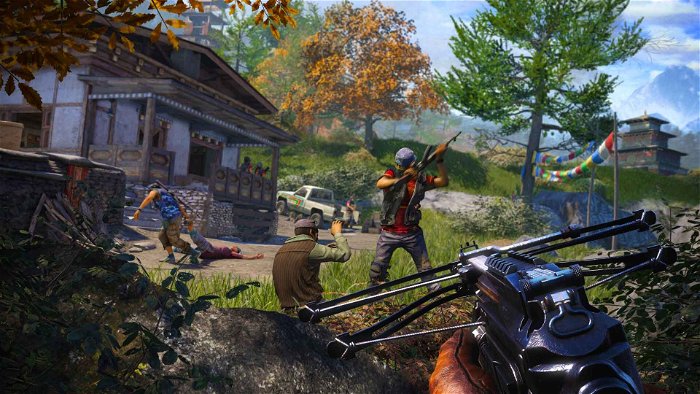This article discusses significant plot points from Far Cry 4, including details regarding the game’s ending.
***
Ajay Ghale, the protagonist of Far Cry 4, comes to the nation of Kyrat for only one reason: to spread his late mother’s ashes in her homeland. Although he was born in the fictional country—which heavily resembles Nepal, in geography and culture—Ajay was brought up in America, his mother having fled Kyrat’s dictatorial government after it ordered his father’s murder. A stranger to this foreign country, Ajay braves a trip into a place torn apart by a brutal civil war simply because he wants to honour his mother’s final wish. He travels to the extraordinarily dangerous nation, risking life and limb, to do nothing more than spread some ashes. It’s interesting, then, that the choices I made ensured the game was finished without him accomplishing this fairly simple task.

Far Cry 4 features a number of opportunities for players to decide how their version of Ajay will respond to the chaotic situation he finds himself in. As soon as he begins helping rebel group Golden Path with their fight against government oppression, it becomes clear that tough choices will have to be made. The Golden Path’s leadership is split between two characters, Amita and Sabal, with drastically different goals for their revolution’s outcome. Amita favours Kyrat’s modernization, which involves violently parting with the population’s religious traditions and funding the group through opium production. Sabal wants to preserve Kyrati customs, even if it means people will continue to live in poverty and young girls like Amita’s pre-teen sister Bhadra will be forced into holy servitude. Ajay, an outsider with little knowledge of the nation, is given the unenviable task of mediating Sabal and Amita’s disagreements. The end result of his—and the player’s—choice to support one character over another is a change in Golden Path leadership and, ultimately, a drastic change in how life will unfold for the ordinary Kyrati citizens. As has become popular in recent videogames, there’s really no “correct” decision to be made here. The player has to make do with the limited information they’re given and live with the (typically grim) outcome. Supporting Amita means that Kyrat’s economy will largely be based on the export of heroin; supporting Sabal ensures that misogynistic religious practices will thrive. Either way, the player is helping make life in Kyrat worse for many of its people.
This bleak choice system extends to other parts of the game, too. The final confrontation with Pagan Min, the foreign leader of Kyrat’s militant government, sees Ajay and the Golden Path overcome impossible odds to free themselves of their colonial occupiers. When there is nothing left to do but deal with Min himself, Ajay enters the dictator’s opulent mansion, confronts the (completely vulnerable) man, and is given the choice to either shoot or hear a few last words from him. By this point in the story, Ajay has learned that Min is not just the only link to his parents’ past lives he’s likely to find, but also the sole person who seems to know where to find the place his mother asked for her ashes to be scattered. Just the same, the game has also provided plenty of evidence that Min is a monstrous person and likely to escape from even any dangerous situation. The player has to decide whether it’s more important to uncover Ajay’s past or ensure Min’s defeat.
It’s testament to the difficulty of this choice that, after having made it, I immediately felt a desire to rewind time and take the opposite approach. My version of Ajay killed Min almost immediately, not wanting so much work to be undone by any possible last-minute escape. The game, suitably, cuts to credits moments after the gunshot rings out and Min is finally dead. There’s no closure to Ajay’s story. He doesn’t learn any of his parent’s secrets; he doesn’t even know how to find the remote area of Kyrat where he’s meant to lay his mother to rest.
Far Cry 4’s story isn’t incredibly compelling as a whole, but the understated decision-making systems spread throughout the game do a lot to strengthen its narrative. Aside from the examples discussed above, there are a great many more, equally agonizing moments that force the player to wrestle with ethical dilemmas during critical plot points. This was unexpected—a welcome surprise in the wake of Far Cry 3’s largely uncomplicated choice system. Ubisoft Montreal, the game’s developer, has implemented something much more interesting here. Despite just how uncomfortable players may end up being with their choices; the overall effect is a far more ambitious story.




